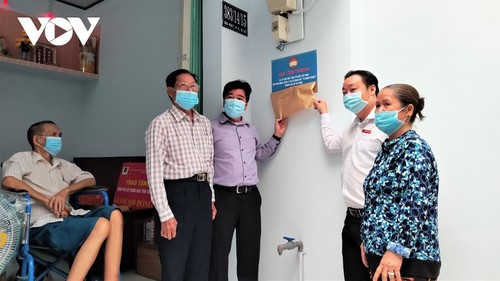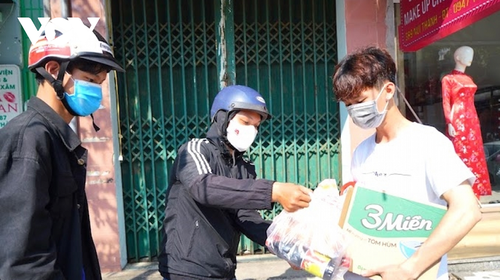 Vietnam Fatherland Front in HCM City presents a charity house to a poor household (Photo: VOV) Vietnam Fatherland Front in HCM City presents a charity house to a poor household (Photo: VOV) |
According to a recent survey of the Analysis and Forecast Center of the Vietnam Academy of Social Sciences, the poverty rate in term of temporary incomes in Vietnam has increased from 10% in the pre-pandemic period to 33.4% this August.
The government has put in place Resolution 68 to provide emergency aid of 1.14 billion USD (26 trillion VND) to help the poor. Most recently, an aid package of 1.67 billion USD (38 trillion VND) extracted from the Unemployment Insurance Fund has been disbursed to help workers and businesses facing difficulties due to the pandemic. Provincial and municipal administrations have also used their budget to help people overcome difficulties. Social organizations have implemented activities to help disadvantaged and vulnerable people, and laid-off workers. Besides emergency support, long-term solutions to reduce poverty have been implemented. The Social Policy Bank reduced loan interest rates 10% for poor and beneficiary people which will be worth 19 million USD (432 billion VND) for 6.4 million people.
The Ministry of Finance and other ministries and agencies have proposed an aid package of 154 million USD (3.5 trillion VND) to buy computers for poor students and schoolchildren.
A report by the Ministry of Labor, Invalids and Social Affairs shows that as of October 14, more than 24 million people have benefited from the government’s Resolution 68 and Decision 23 with total funding of nearly 960 million USD (22 trillion VND).
 Necessities are delivered to the poor during the pandemic Necessities are delivered to the poor during the pandemic |
Municipal and provincial administrations have implemented further policies to help their citizens overcome pandemic difficulties.
In Hanoi, nearly 290,000 people have benefited from 13 million USD (300 billion VND) in support packages from the city budget. With 13.3 million USD (304 billion VND) in donations from the public, the city has helped more than 1 million local residents.
In HCM City, the locality is hardest hit by the pandemic, the city administration is carrying out policies to help poor people escape poverty sustainably.
Promoting policies to help vulnerable people and poor people has been the consistent policy of the Vietnamese Party and State over the decades. Despite the pandemic of the last two years, the Vietnamese National Assembly and government have doubled funding for poverty reduction and allocated 21% from the central budget to ensure social welfare – the highest proportion in ASEAN.
The government has provided direct support for 13 million people affected by the pandemic with particular attention to the poor. The NA has recently approved investment for the National Target Program on Sustainable Poverty Reduction in 2021-2025 with a total funding of 3.3 billion USD (75 trillion VND). Beneficiaries of the program include those who have recently become poor for various reasons, including the COVID-19 pandemic, and poor people in urban and rural areas.
With the motto “Joining hands for the poor- leaving no one behind”, the Prime Minister has asked for enhancement of policies on sustainable poverty reduction and better care for the poor, disadvantaged and vulnerable people, especially those affected by the pandemic. The government will continue to prioritize more resources from the State budget and mobilize social resources to strengthen Vietnam’s poverty reduction.
Activities implemented during the Peak Month for the Poor from October 17 to November 18 launched by the Vietnam Fatherland Front have helped poor people overcome difficulties due to the pandemic.